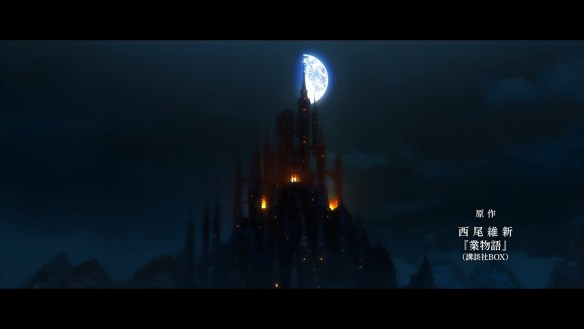Hello folks, and welcome back to Wrong Every Time. Today we’re continuing our journey through what I can safely say falls on the “Monster” side of Monogatari’s Off/Monster Season collection, given both its protagonists are either alleged or self-defined monsters. On the one hand we have Deathtopia, an immortal vampire bound only by the proud weight of her own words. On the other, we have Acerola, an unwilling “princess” who brings ruin to all, and wishes only for a single life to save.
Whether they consider them a curse or blessing, both have clearly been isolated by their powers. Deathtopia had spent so much time in her lonely castle that it fell to her servant to inform her the kingdom had fallen, while Acerola’s quest for redemption has only brought more lives to ruin, raising the question of whether her existence itself is a curse. Yet in spite of the fantastical nature of their afflictions, their story echoes a familiar Monogatari refrain: the necessity of coming to peace with your own nature, of learning to love yourself, to accept all your sharp angles, and thereby reach beyond your own torment and positively impact the life of another. Let’s see how our vampire and death princess are fairing!
Episode 8
The exterior shots of this castle are always quite evocative; the tower is a silhouette, a shadow in the night, lit only by what appear to be fires burning at inconstant intervals about its surface. It poses like a creature crouching in darkness, ready to pounce
We begin with Deathtopia and Tropicalesque brainstorming ways to kill the princess, as you do
Tropicalesque attests that Acerola’s condition is not a curse, but a blessing. His argument basically underlines the semantic nature of this distinction – whether we define a condition as a curse or blessing is generally done after the fact, as an assessment of our personal feelings regarding that condition. A thing’s “innate nature” is more difficult to discern, and there’s the further question of whether it is actually meaningful to do so – a question that echoes Nise’s “fake versus the original” discussion, where the effort and intent underlying the fake’s existence was ultimately what made it meaningful, rather than any objective, external faculty of the fake itself
“I have already decided upon that. That woman is the first thing going into my empty stomach.” Once again, Deathtopia’s pride is portrayed as her biggest weakness. Her inability to go back on her own prior declarations will likely lead to her destruction; she is bound only by her self-certainty, but those are heavy chains indeed
“It is painfully obvious after five deaths.” The storyboarding emphasizes this useless repetition, offering the same cycle of establishing shots leading into the throne room
Deathtopia attempts to narrow down the challenge here – it is not the witch’s curse they are attempting to circumvent, but Acerola’s underlying beauty
“In other words, you simply must not be so beautiful.” That does make sense!
“You can simply pretend it so.” An echo of that first discussion – can her intent alter her nature?
“I shall try my best to look vulgar in my behavior.” Is her poise essential to her overpowering beauty? Regardless, the fact of our modern Shinobu’s demeanor basically demonstrates the truth of Deathtopia’s point here – by putting on a performance of haughty, rude behavior, Acerola eventually changed her fundamental nature. A lie embraced with sincerity can over time become the truth
And then Deathtopia considers a new name for her. As considered in the previous episode’s discussion of the term “monster,” names obviously possess an inherent power. To name something is in some way to define it
Only upon Tropicalesque’s prompting does Deathtopia realize she has died again. Her life is a colorless circle, a repetition of events so mundane their passing goes unnoticed
Deathtopia finds Acerola on the verge of poking out her own eye, and frantically stops her
“You’d be doing the same thing as all the humans who offered their lives to you.” Acerola’s quest to mar her beauty has ultimately made her a slave to it as well
“It’s messy but still orderly.” Acerola’s attempts at an unkempt bedroom appearance only result in a perfectly geometric arrangement of quasi-disorderly dresses. Her nature is still too fundamentally beautiful to allow for true disorder; we’re a far distance from her happily munching through a skull in Kizu
Deathtopia even teaches her that “kah-kah” laugh. She’s becoming more of a significant parental figure than Acerola’s actual parents, while demonstrating that Shinobu’s affectation was not born in personal pride, but rather a longing to make herself someone who could actually get close to others. Her dignified beauty was simply too much; by becoming an undignified tyrant, she became flawed enough for others to approach her
No one likes perfection, after all. We distrust those who seem perfect, and find comfort in the flaws of others
Tropicalesque questions if Deathtopia truly intends to kill Acerola, and she cannot provide a straight answer
Another fun art variation for Tropicalesque telling of the prince’s kiss, with the sleeping princess conveyed through lightly sketched colored pencils. An inherently airy, “soft” medium that fits perfectly for this children’s tale
Deathtopia appears to be diminishing across her many deaths, just as Acerola was diminished by losing her limbs. Bound by her prior declaration to eat Acerola before anything else, she has condemned herself to a slow, repetitive version of the same death this kingdom’s humans all suffered
Gorgeous shot of Acerola from above as she languishes in the remnants of what once was Tropicalesque. Even in the midst of such violence, she is still terrifyingly beautiful
Even now, Deathtopia refuses to let her leave. Is it her own pride in following her prior declarations that drives her, or her absolute infatuation with Acerola? At this point, having undergone so many rituals of sacrifice and reincarnation within these chambers, it seems doubtful Deathtopia has any understanding or control over her destiny any longer
The shifting of a vampire’s physical form based on their strength is put to effective use here; this profile shot of the two of them sees Acerola towering over Deathtopia as she dictates what will happen next. The power dynamic between them has been completely reversed
“I’m the only one who is allowed to step on him.” From a position of absolute confidence and authority, Deathtopia now can only beg Acerola not to rob her of this tiny remaining fragment of authority
“By you eating him, his death is no longer meaningless or wasteful.” Even the violence of a vampire at least sustains one life, that of the vampire itself. In contrast, Acerola’s aura of destruction is worse than useless, as it only brings suffering even to its creator
It’s also an echo of what Acerola was already seeking – a life she could “save.” Her destruction of Tropicalesque ended up saving Deathtopia, so is her task complete?
Acerola asks to be made a vampire. “At the least, I want to accept the lives that are offered to me.” To give them the same meaning Deathtopia offered Tropicalesque’s death
“I will eat all the lives I have killed.” The only way to pay them proper respect
Acerola is presented in total silhouette here, emphasizing Deathtopia’s inability to recognize this version of her
But of course, to sink her fangs into Acerola would also count as an act of violence against her beauty
Acerola’s plan to counter this carries us back to the question of whether intention fundamentally changes the nature of an act. If intention can actually resculpt Acerola’s personality, if it can define the line between a monster and a victim, can it allow Deathtopia to bite Acerola without invoking her defenses?
“Indeed, it is too much of a waste for you to remain human.” Deathtopia has fallen fully under her spell
My sympathies to the translators who had to grapple with Acerola constantly, self-consciously shifting her level of formality
“I’m sure it’s a virtue to believe in people, but I am not a human. I’m a monster.” Deathtopia is only bound by the rules she sets for herself – though of course, she has now broken her vow to eat Acerola before anyone else
And at last, Deathtopia gives her her true name, true not because it is an immutable fact of reality, but because Deathtopia offered it and Acerola accepted it. A name that carries a vow that she will eat each of her victims with love, and seek always for the prince who might break the spell
“I will keep trying hard so that I may be worthy of you and this name you have given me.” With the name as a beacon, her intention will allow her to become the vampire worthy of it. Intention can become truth, so long as we are certain of our intent
“A final lesson: when you are really happy, laugh like this.” Deathtopia disguises their sincere joy at Acerola’s embracing of the name as another lesson
“Eating and loving meant the same thing.” Resolving the contradiction of their desires in the simplest way possible
And Done
Thus we learn the origin of Kiss-shot Acerola-Orion Heart-under-blade, a tale as fanciful and dramatic as the name itself. Doomed to eternal loneliness by her allegedly cursed nature, she found salvation in redefining the nature of her curse, and appending a meaning to her wanton destruction through its connection to her vampiric appetite. Though this arc was certainly a tonal and narrative digression from Monogatari’s usual antics, that fundamental obsession with coming to a happy understanding of the self, an identity that can actually drive you forward with hopeful intentions, is the same obsession that has driven this franchise all along. Ultimately, definitions of identity are only as useful or true as we allow them to be; tragically, as both Deathtopia and Acerola demonstrated, we are exceedingly good at becoming prisoners of our own assumed natures. But just as Deathtopia sculpted Acerola’s identity, so did Acerola’s presence naturally warp Deathtopia’s – through the irritant of their collective impossible desires, both found an escape from their self-assigned limitations. Acerola did not break her curse; she simply grew larger than its capacity to define her.
This article was made possible by reader support. Thank you all for all that you do.




